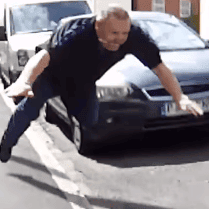So it’s an app on Linux which you can get from github, and then an app on the Quest store. And it works by loading up the app on the Quest and streaming it all to there. Just AVR on the store, made by the same people as the GitHub. There’s guides online and it might be a bit fiddly if you’re not good with Linux. It still seems like a work in progress and you’ll need strong WiFi.
- 4 Posts
- 43 Comments
I’ve been using AVR for VR fairly successfully recently on Linux. I’m not massive on VR but it’s a much better experience than quest native, other than very slow load times.
It looks as though your cousin’s “injuries” are only to his pride—both “in the doghouse” and “throwing someone under the bus” are vivid idioms, not literal events. In everyday English they just mean (1) he’s in trouble or out of favor, and (2) you shifted the blame to him to save yourself. So unless there really was a wayward city-bus careening through a backyard kennel, his bones and fur are perfectly safe—only his feelings might be a bit flattened. Below is a quick crash-course on both expressions, plus a few tips for patching things up.
- “In the doghouse”
Meaning
To be in the doghouse is to be in disgrace or disfavor with someone whose approval you normally enjoy—most often a partner, family member or boss. It conjures the image of being banished outside with the dog until you earn forgiveness.
Where it came from
The first clearly figurative use shows up in U.S. slang dictionaries of the 1920s (“in dog house, in disfavor”) and gained traction through the 1930s press. Popular lore also credits Peter Pan (1911) for spreading the image of Mr Darling sleeping in the kennel after a parenting blunder, giving the phrase extra cultural punch.
- “Throw (or toss) someone under the bus”
Meaning
To throw someone under the bus is to sacrifice, blame or betray them for self-preservation or advantage, as though pushing them into traffic while you stay safe on the curb.
Origin snapshot
The earliest solid print example so far is from 1982 in The Times (London), with wider U.S. political use exploding by the 2008 election cycle. Its exact birthplace is still debated, but all roads lead to late-20th-century journalism and politics.
-
What this means for your cousin
-
Tips to get him out of the kennel-zone
-
Own your part – Admit you “drove” the bus. A candid apology often shortens kennel time.
-
Repair, don’t excuse – Help fix the original problem rather than focusing on who got blamed.
-
Set future guardrails – Agree on how you’ll both handle mistakes next time so nobody ends up canine-camping again.
-
Inject a little humor – Shared laughter about the idioms can defuse tension, reminding everyone the “injuries” were metaphorical.
Key sources consulted
Phrases.org.uk: first printed definition of “in the doghouse”
Wikipedia entry on “Throw under the bus” for meaning & early citations
English StackExchange & TheIdioms.com for origin discussions
Paula Reed Nancarrow blog on Peter Pan link to the doghouse image
Bottom line: your cousin’s ego may need a pat on the head, but his vitals are almost certainly intact. A well-timed apology (and maybe a chew-toy peace offering) should get him back on the porch in no time.
Is it self hosted or do you pay someone else to host it? Do you have a fixed IP? I’ve always wanted to try and set it up but it definitely seems like one of the riskier ones if you then use it to sign up to a lot of things.

 4·3 months ago
4·3 months agoIf you’re interested in seeing how good it’s gotten now, some are impressive https://sora.com/explore/images
Awesome thanks! Has mine! Hopefully someone does similar for the NZXT Kraken Elite display, but I can live with the large temperature number.
Link? I have some rgb ram I’m waiting on something like this for. Happy to donate!
In Europe this would likely be 30 mins commute on a train if you work in any sizable city. And you can take your bike on the train and finish the rest of the commute on the bike.
Have you ever seen Amsterdam? About 60% of people ride a bike daily, and it accounts for about 40% of all traffic movements in the city.
If you replaced all of these bike journeys with cars, the yearly economic burden would be around €750,000,000 (~$785,000,000) from congestion alone. Are bikes good for all journeys, no. But it’s hard to say that most cities wouldn’t benefit from design that allows more short bike journeys.
If you’re willing to walk somewhere then the idea of the bike is to make that trip quicker and expand the range of the trip in the time you have. Not to replace all car journeys.

 2·4 months ago
2·4 months agoHmm, that could be an attempt at bonding over a common enemy? Kind of like talk bad about the boss behind his back, so that you bond woth your peers? Generally not for everyone, but could see how people get fixated on it if it works for them. Or maybe they are just caught up in the negative media and it has a big effect on their overall mood. Do the happier countries you mentioned have less reliance on media? Again, negative generates views, thats why the news is usually mostly bad.

 13·4 months ago
13·4 months agoI think this is a classic case of “The complainers are way more vocal than the life enjoyers”, combined with modern technology being set up to promote controversial content. When someone’s enjoying this life and being chill, they also don’t usually care about spreading thier message. The complainers are either memetic or often political and seem to enjoy a much greater platform. Also more controversial content generates more negative engagement, and most social media promotes content that has high engagement, because it benefits them to have users engage and stay on the site longer.

 2·5 months ago
2·5 months agoUK kettles use the standard 240V mains and it’s excellent. Under 2 minutes to boil 3 US Pints with a 3000 Watt kettle.
I’m not trying to cause offence, but is there an ethical way to eat animals, or does it become unethical as soon as we have the means and ability to not do so?
It seams like for a lot of people, thier traditions and culture outweigh thier personal ethical benefits and thats the biggest problem that has to be overcome. Some places do not allow for growing sufficient and complete protein to feed the population, for example Egypt or Bangladesh. It seems that the cultures might be harder to overcome in these places.
I was thinking maybe insects as a protein source would be a positive step for these locations. But thats obviously hard to overcome culturally. What do vegans think of eating insects?

 11·6 months ago
11·6 months agoCTRL+SHIFT+L to sync my room lights to the screen using huenicorn. Plan on hooking up openrgb as well when I can be bothered to write a script.
Try a mesh VPN and SSH would be my advice

 7·6 months ago
7·6 months agoIn the UK you can get on a train without booking a ticket for that specific train, for example an open return or just a day pass. The train company has no idea how many seats will be taken or how many people will get on the train. So say it’s a 10 carriage train. Every seat is taken by someone, reserved or unreserved, and theres not a bit of standing room anywhere (this is very common). Which person sat on a reserved red light indicator seat should you kick out? And how do you know they didn’t reserve that seat specifically before you do that? Or do you kick someone out of a green lit non-reserved seat, with thier proof that the seat is not reserved and they are allowed to sit there, and your proof that you dont even have that seat reserved. It will also be the old people and small children sat down, and you won’t really be popular if you make them stand. Yeah you’re not sitting if you have this ticket. You’ll likely be stood by the entrance door for 3 hours instead. This seat reservation ticket may as well say, “sorry no seat today”, and it’s definitely infuriating to lean that you will be standing for your journey when you’ve payed full price for a seat, maybe £40 depending where.

 44·7 months ago
44·7 months agoWouldn’t you be benefiting from your friends? It’s ok for a little bit, but if they live there permanently then they will pay off your mortgage and have nothing to show for it themselves. That sort of thing might build resentment long term. Though in the short term you both benefit.
But as I’m sure you’re aware, any money issues may sour the relationship. Even just having a formal contract with exchange of money could change the dynamic drastically.

 7·9 months ago
7·9 months agoSounds like you’re well paid and your time is valued, I imagine most devs would be happy with that!
WIN+R , “shell:startup” in future by the way.
The other list you saw is programs that have added thier own AutoRuns registry keys.







I appreciate your viewpoint, your garden looks great, but that short grass is a barren wasteland for biodiversity. You have to work out what’s important for you, and all sides should respect that decision.
It would be possible to maintain some of it as a native wildflower meadow instead, and keep the overall length managed without using weed killers and poisons and huge amounts of water like grass requires. There’s no such thing as a native weed, but you do have to remove some individuals for diversity and soil health if they grow too large. I do this with brambles and other large light blocking species, as I don’t have the space to support them, even though they’re great for wildlife, they end up having a short term negative biodiversity impact in a small space. Even a small corner or container of native wildflower would support native pollinators and vastly improve the health and biodiversity of your entire garden. Get a solitary bee hotel, if they exist in your country. Leave a pile of sticks/logs somewhere for insects. Get a pond if you can. You already compost so that’s good. Nature isn’t meant to be tidy, neat or uniform. But I understand that not everybody can appreciate the value that could be gained from millions of gardens improving thier biodiversity, and that conforming with others and past practices and traditions may be a stronger factor for some people to want to keep their gardens neat. You’re clearly a good gardener, but no wildlife conservationist, you can have both though. It’s not about being intentionally messy, it’s about creating conditions for wildlife to be invited in. Those fully overgrown gardens are probably great for nature, but you are right that they have to consider the size of the space and the proximity of neighbours before doing that, and not being considerate of that can make them a bit of an asshole.